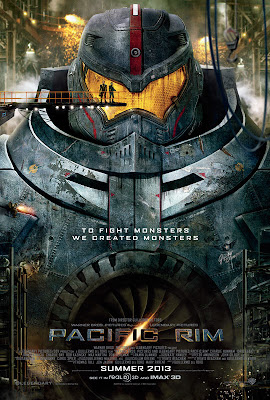Pacific Rim
I've read a number of reviews which compare Guillermo Del Toro's Pacific Rim to Mighty Morphin' Power Rangers. This is not a bad comparison - they share the same basic plot: monsters from another universe are trying to break through to this one. Giant mechs are humanity's best hope. These mechs are piloted by people who engage in combat in a violent form of synchronized swimming. The problem with these reviews is that they make the comparison as a pejorative, which it is not for the fan of kaiju-eiga (giant monster movies, particularly Japanese rubber-suited-battle-fests). C.S. Lewis advised critics to know what they are criticizing before doing their work. Pacific Rim is a kaiju-eiga. It stands on the shoulders of many men-in-suits, not just the Power Rangers. For the Power Rangers themselves are the product of Ultraman and Godzilla. Pacific Rim pays homage to all those films, and then some, from the Gundam series to Neon Genesis Evangelion. Yes, it uses ideas we've seen before. Yes, it engages in blockbuster cliches. But in addition to not really knowing the genre they're watching, these nay-saying critics have neglected to note something else.
Pacific Rim is Power Rangers made by Guillermo del Toro. And that's saying something.
Fans of del Toro's more serious work, such as The Devil's Backbone and Pan's Labyrinth may be disappointed by Pacific Rim's utter lack of serious subtext or social commentary. Admittedly, there are some brief overtures to the environment and the decommissioning of military forces, but these are in the service of the narrative, not political statements. Del Toro's heroes are of the same stripe as many of his other films: they are rogues, rebels: they are no longer the military, they are "the resistance." If there is any political subtext, it is just that del Toro still hates Facism. This is nothing new, and Pacific Rim adds little to an argument del Toro made better in Pan's Labyrinth. This film is part of del Toro's Hollywood legacy, built upon action adventure hits such as the Hellboy films and Blade II. The takeaway message I left the theatre with is that in the case of Apocalypse, we should put Idris Elba in charge.
The film is loud, bombastic, and over-the-top, much like the Jager mechs at the heart of the film. It is unapologetic in its imagination of disaster. It is precisely the sort of "inadequate response" that Susan Sontag spoke of in the 1960s in reference to the SF films of her day. I have also seen critics decry the film for pandering to audiences' desire to sit mesmerized by shiny lights while shoveling buckets of popcorn into their mouths. The lights are shiny, and the film is of the popcorn variety, and this is not a bad thing.
To paraphrase Michael Chabon's "Trickster in a Suit of Lights," when did entertainment become a bad word? Chabon was speaking of short fiction, but the idea holds true for film as well. Before film was a propaganda device or a means of meaningful documentation, it was a means to entertain. It is still its raison d'etre. But entertainment does not necessarily mean low quality. Chabon champions the short story writers who entertain in the ghettos of genre, but do it well. Entertainment need not be shoddy. And Pacific Rim, as Forbes stated, is what a summer blockbuster should be. It is a tight narrative with brisk pacing that keeps us interested in the humans behind the mechs. It's the movie Transformers could have been if it hadn't been written by committee, and if it had remembered we came to watch giant robots, not Megan Fox.
Pacific Rim delivers the viewer into an immersive, fully realized world that bears a skeletal resemblance to Power Rangers. But the similarity is only skeletal. The flesh that del Toro has placed over that skeleton produces a very different experience. If Power Rangers is targeted at my 7-year old son, Pacific Rim is the movie that the seven-year old will love when he is 17, 27, 37, and so on. I saw grown men mimicking Jager moves as we left the theatre. I wanted to emulate those moves myself.
This movie is for the fan of the kaiju-eiga. It is a twenty-first-century overhaul of the giant monster film where two men in rubber suits engage in Wrestlemania in a miniature metropolitan area. The destruction is glorious, the fights are breathtaking, and the characters are the sort one expects when they're named Hannibal Chau, as Ron Perlman's is for his favorite historical figure, and his favorite Asian food joint. They are pulp heroes in a mech anime given flesh, set to the Wagnerian-metal blend of Ramin Djawadi's soundtrack. If you thrilled to Power Rangers when you were a kid, you need to see Pacific Rim. The Rangers are all grown up and ready to go fishing.






"when did entertainment become a bad word?"
ReplyDeleteI really liked this point. I agree.